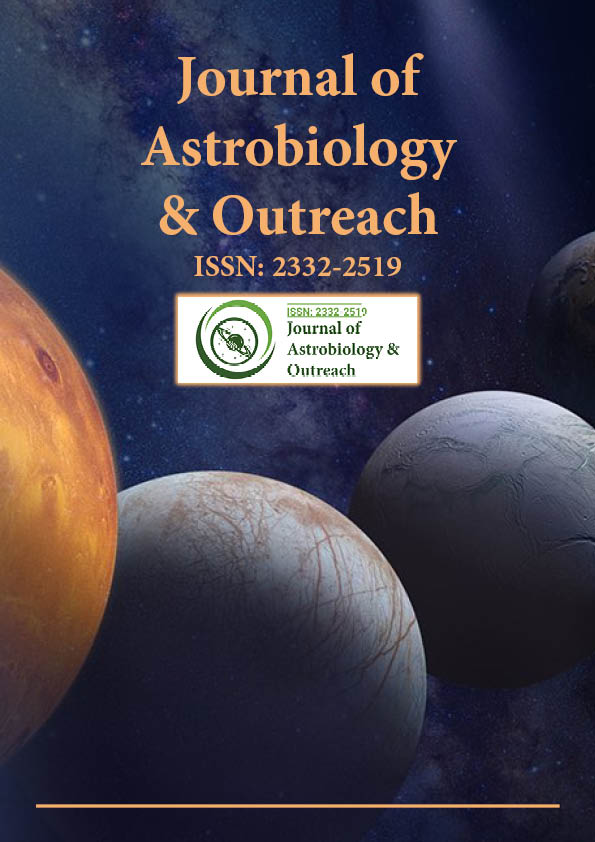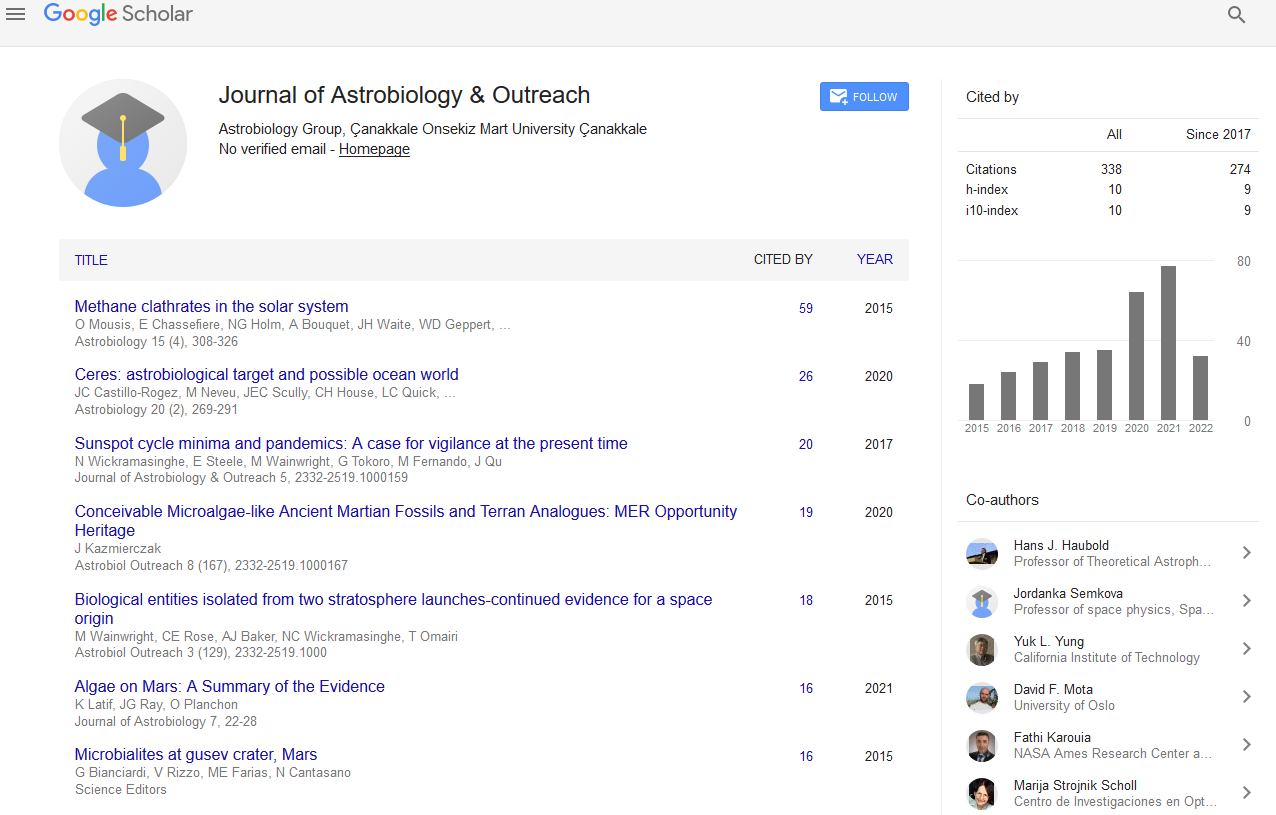Indexed In
- Open J Gate
- Academic Keys
- JournalTOCs
- RefSeek
- Hamdard University
- EBSCO A-Z
- OCLC- WorldCat
- Google Scholar
Useful Links
Share This Page
Journal Flyer

Open Access Journals
- Agri and Aquaculture
- Biochemistry
- Bioinformatics & Systems Biology
- Business & Management
- Chemistry
- Clinical Sciences
- Engineering
- Food & Nutrition
- General Science
- Genetics & Molecular Biology
- Immunology & Microbiology
- Medical Sciences
- Neuroscience & Psychology
- Nursing & Health Care
- Pharmaceutical Sciences
Opinion Article - (2023) Volume 11, Issue 6
The Difficulties and Advantages of Digital Age Astrobiology Education
Edward Carr*Received: 14-Nov-2023, Manuscript No. JAO-23-24815; Editor assigned: 17-Nov-2023, Pre QC No. JAO-23-24815 (PQ); Reviewed: 01-Dec-0003, QC No. JAO-23-24815; Revised: 08-Dec-2023, Manuscript No. JAO-23-24815 (R); Published: 15-Dec-2023, DOI: 10.35248/2332-2519.23.11.326
Description
In the digital age, the innovations in education are expanding beyond traditional boundaries, with disciplines like astrobiology extending beyond the limits. Astrobiology, the scientific study of life beyond Earth, has witnessed a surge in interest and relevance in recent years. The vast cosmos and discover exoplanets, the need for a comprehensive understanding of astrobiology becomes more critical. However, educating the masses about this complex field faces its own set of challenges and prospects in the digital age.
Complexity of the subject matter
Astrobiology is a multidisciplinary field that combines elements of astronomy, biology, chemistry, and geology. Teaching such a complex subject requires a careful balance to ensure that learners from diverse backgrounds can hold the fundamentals. Traditional educational approaches may struggle to convey the complex interplay of these disciplines.
Accessibility and inclusivity
Not everyone has access to a physical classroom or a wellequipped laboratory. Accessibility remains a major problem, especially for those in remote areas or developing countries. To address this gap through digital platforms, problems like dependable internet connectivity, digital literacy, and the accessibility of the right equipment must be resolved.
Rapid technological advancements
The digital age is characterized by the rapid evolution of technology. Keeping educational content up-to-date and relevant becomes a continuous challenge. Educators need to adapt quickly to incorporate the latest discoveries and advancements in astrobiology, which demands a flexible and dynamic approach to curriculum development.
Lack of standardization
The absence of standardized curricula for astrobiology education prevents its widespread integration into academic institutions. Unlike more established disciplines, astrobiology lacks a universally accepted set of learning objectives and outcomes. Establishing these standards is potential for ensuring consistency and quality in digital education initiatives.
Interactive digital platforms
The digital age presents an opportunity for interactive learning experiences. Virtual labs, simulations, and augmented reality applications can immerse students in the interesting world of astrobiology. These tools not only enhance understanding but also provide different learning styles, making the subject more engaging.
Global collaboration
Digital platforms facilitate global collaboration among educators, researchers, and students. Astrobiology, being inherently collaborative, can benefit from a worldwide community of knowledge. Online forums, webinars, and collaborative projects enable individuals from diverse backgrounds to contribute their perspectives and insights.
Public engagement and outreach
The digital age provides unprecedented opportunities for public engagement in science. Social media, podcasts, and online events can be used to initiate the interest in astrobiology beyond traditional academic settings. Engaging the public results in a scientifically literate society and encourages the pursuit of careers in science.
In navigating the complexities of digital age astrobiology education, there exists a delicate balance between overcoming challenges and harnessing the vast prospects. The integration of cutting-edge technologies, global collaboration, and customizable learning paths holds the potential to unlock astrobiology education in the digital era. As we continue to understand the mysteries of the cosmos, ensuring that the knowledge is not confined to a select few but disseminated widely becomes an imperative mission for educators, scientists, and enthusiasts alike. Through a concerted effort to address the difficulties and capitalize on the prospects, we can inspire the next generation to boldly explore the frontiers of astrobiology in the limitless expanse of the digital age.
Citation: Carr E (2023) The Difficulties and Advantages of Digital Age Astrobiology Education. J Astrobiol Outreach. 11:326.
Copyright: © 2023 Carr E. This is an open access article distributed under the terms of the Creative Commons Attribution License, which permits unrestricted use, distribution, and reproduction in any medium, provided the original author and source are credited.

